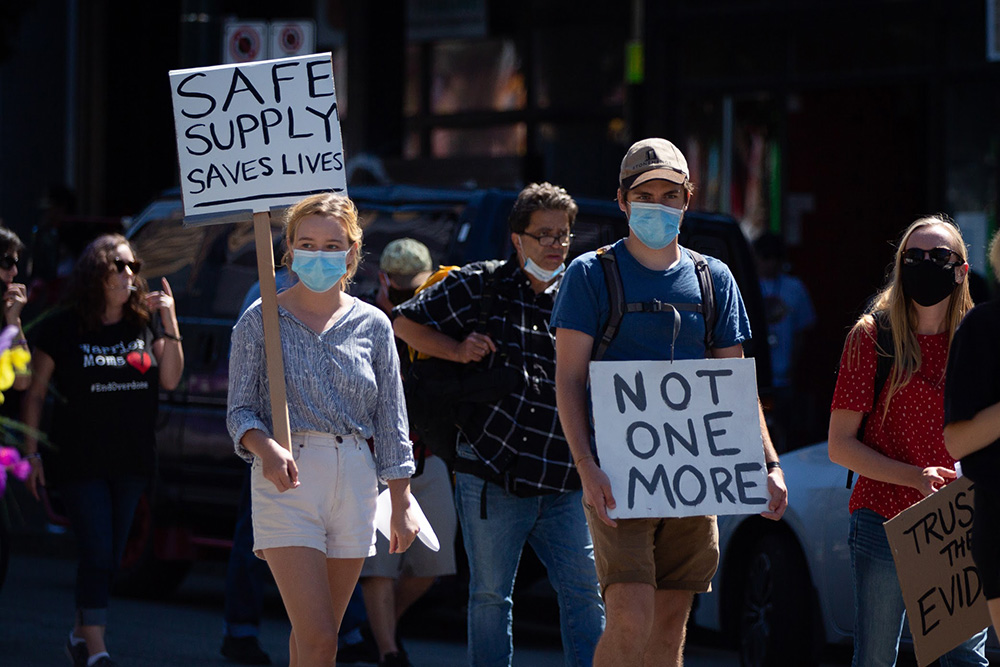The all-party legislature health committee has slammed the province’s response to the toxic drug crisis as unco-ordinated and lacking urgency and accountability.
The Select Standing Committee on Health released its report Tuesday after nearly seven months of public and expert consultation into the crisis that has killed more than 10,000 British Columbians since 2016, when a public health emergency was declared.
It found that provincial and health authority efforts haven’t gone far enough to stop or slow the average of six people dying per day.
“The toxic drug supply knows no borders and is hitting communities around the world. We focused on finding solutions for B.C. to stem the tide,” said committee chair and NDP MLA for Vancouver-Hastings Niki Sharma in the legislature Tuesday.
“It is clear that we need to work collectively to find and focus on solutions that will save lives and help people achieve wellness.”
But the report stopped short of recommending bolder options many experts and advocates have called for, like low-barrier safe supply through compassion clubs or raising income and disability assistance rates above the poverty line.
“We must see significant investment across the entire continuum of care,” said committee deputy chair and BC Liberal MLA for Prince George-Valemount Shirley Bond Tuesday morning. “We need a sense of urgency, and we need to evaluate, monitor and report publicly.”
The committee is composed of 10 MLAs from across the province, including six NDP MLAs. It issued 37 recommendations to build an array of options for people who use drugs, from increasing harm reduction efforts like naloxone kits and overdose prevention sites to rapidly scaling up prescribed safer supply to separate people from the poisoned illicit drug supply.
There are still many barriers to people accessing alternatives to the illicit supply, “including the need for prescriptions, witnessed daily doses, and pharmaceutical alternatives that are not strong enough to prevent withdrawal symptoms or that are available in preferred modes of consumption, such as smoking,” the committee found.
The recommended actions “need to be taken immediately to save lives, and it is our committee’s hope that implementing them now will move B.C. out of this public health emergency,” the report says.
Many of the committee’s calls echo the urgent recommendations of a death review panel report released by the BC Coroners Service last March.
That panel of experts recommended sweeping and urgent action to scale up safe supply across the province on timelines as short as 30 days.
The provincial government received the report but did not commit to accepting all the recommendations, and has already passed many of the deadlines outlined in the report.
The committee report also called for hard timelines and benchmarks to be incorporated into the province’s current response, but did not specify when.
It also recommended a full review of the Mental Health Act with public consultation, incorporating mental health services into primary care and legislating the regulation and oversight of licensed detox and treatment centres.
And the province should examine whether the upcoming decriminalization of people in possession of up to 2.5 grams of some illicit substances is enough to save lives, the committee said.
Minister of Mental Health and Addictions Sheila Malcolmson thanked the committee for its report but did not say whether the province would adopt the recommendations.
“There is more to do to tackle this public health emergency,” she said. “We will not stop working until we turn this crisis around and people in our province can get the help they need."
In May 2021, the BC Greens urged Premier John Horgan and then-interim Opposition leader Shirley Bond to convene the special committee to allow all-party collaboration on solutions to the crisis. The committee started work on April 4.
At the time Green Leader Sonia Furstenau said she hoped the all-party committee would be able to propose bold solutions and avoid political concerns about tackling the crisis head-on.
But Furstenau, a committee member, said she and the party were disappointed Tuesday’s report didn’t go further to stop people from dying.
“We heard from a wide range of presenters… that low-barrier safe supply is necessary for reducing the toll of the toxic drug supply,” said the MLA for Cowichan Valley. “While there is a need for scaling up mental health supports and treatment for people who seek it, we are seeing every day that the illicit toxic supply is taking people’s lives before they can access those services.”
In the legislature Tuesday, she urged incoming premier David Eby’s government not to let this report languish. “It is now up to government, as it has always been up to government, to take action. This will take courage and political will, and I hope to see both of these in the days and weeks to come,” said Furstenau. ![]()
Read more: Health, Rights + Justice, BC Politics

















Tyee Commenting Guidelines
Comments that violate guidelines risk being deleted, and violations may result in a temporary or permanent user ban. Maintain the spirit of good conversation to stay in the discussion.
*Please note The Tyee is not a forum for spreading misinformation about COVID-19, denying its existence or minimizing its risk to public health.
Do:
Do not: